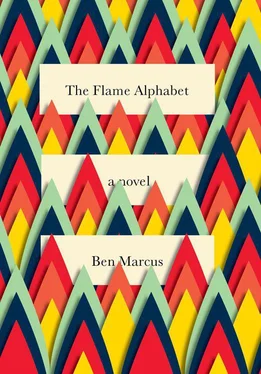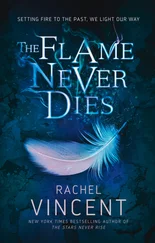“Yeah, that did occur to me. Right around the time that you were drawing fluid out of children’s bodies.”
“But you did it anyway? See it through to the end even if it’s obvious?”
“Well, have you stopped to wonder why that very script, which you say they can’t understand, is still making them sick? Isn’t that a little bit curious to you?”
LeBov checked his watch again. He closed his eyes in some exaggerated show of irritation.
“Do you have any confirmation that we’re even showing them your stupid alphabets? Have you verified that?”
I thought of my time on the observation deck, watching the subjects spoil in the heat, get carted off. Wagons of paper were brought to them, unloaded, shoved in front of their eyes, and they pored over it like dutiful patients, scrutinizing it until their vitals flared and someone called a code. This was my work that sickened them, even if I could not see it precisely. It must have been my work they saw. But I knew that I was never on-site confirming that, never actually down there to be sure. Such vigilance hadn’t occurred to me.
It should have been a relief to discover, to even consider, that I had not caused more pain for all of those people.
But I somehow did not feel relieved.
LeBov stood up, pushed my alphabets into the trash. “C’mon,” he said. “We’re going for a walk.”
He helped me up. I didn’t realize I needed it, but I was unsteady, a bit nauseous once I got out of my chair. His hands under my arms felt like metal tongs. We’d be back soon and I’d feel better, LeBov assured me. There was something small he wanted to show me, something he thought might be of interest.
Into the halls of Forsythe we went. We climbed the ramp and came upon the assembly area, but this usually hectic space was empty. Everything was quiet.
We took the stairs to my wing. On the landing we stepped through the side door that brought us to the observation deck, where I’d only ever stood with crowds of other scientists, looking down at the testing below.
Again I saw no one, just the decontamination procedures outside in the courtyard, a man curled up under the harsh ministrations of a hose.
Here I tried to take a step that wasn’t there and I stumbled. LeBov reached for me, but I fell, and for some reason I couldn’t get my hands up in time.
My face smashed undefended against the floor.
I scrambled back up but wobbled, tipped, and fell again. The walls were spinning. Above me stood LeBov, studying me.
“That’s something we’re working on.” LeBov stuck out his hand for me. “There are some balance things we need to tweak.”
I got up without his help but as we walked to the observation deck I held his arm in case I fell again.
We were still alone. Since I’d left that room with LeBov we’d seen not a single person.
“Where is everyone?”
“I don’t care for this place outside of lockdown. The bustle and whatnot. The human contact. I find it distracting. It’s rather nice not to be seen, don’t you think?”
It didn’t really feel nice.
A trickle of blood fell from LeBov’s nose and he caught it with a tissue. Then the tissue blackened, started to drip.
He laughed, his head tipped up to stop the blood, which ran from the tissue in a trail down his wrist, right under his shirtsleeve.
“C’mon,” he said, through a bloody hand, “I want to show you something.”
LeBov’s hands and wrists, I noticed, had been badly burned. That would have been the gel from the listener he stole.
We took a hallway that I’d not seen open before, stepped into a side room that featured a narrow spiral staircase, and then descended several flights until the light from above shrank into a star before disappearing, shutting us in darkness. I hugged the railing, took small steps, and kept my eyes down. Something had scrambled my balance and I felt wrong in the head.
At the bottom of the stairs we went through a double door, moved down further hallways that at first I thought were painted brown, but when I came closer I saw that the walls themselves were glass, pressed dead against sheer cliffs of dirt outside. We were underground, in a basement corridor built into hard-packed earth.
LeBov opened a tall door and we stepped into a space that, at first, seemed entirely empty.
“Welcome home,” he said, and he gestured me inside.
The room had no finished floor, just soil, with stone walls climbing several stories. In the center, lined with benches and some small generators, was a hole. A perimeter of klieg lights dumped a wretched blast of light down its center, so it looked lit from below. And from the mouth of the hole came the prettiest sight: a bouquet of bright orange cables as if retched up from the center of the earth itself.
I commanded myself to show no reaction.
They’d found themselves a Jewish hole, and it looked like they’d been working it hard.
LeBov said, “So what do you think?”
I moved to the rim of the hole, looked in. They’d roughed out scaffolding down there, reinforcing the crumbled sides of the hole with long, warped two-by-eights. A double-wide ladder, black handprints smeared on the rungs, disappeared deep into the pit, and a braid of extension cords passed the orange transmission lines on their way down.
Was there a hut over this hole once, before it became a high school? I looked over at LeBov, who allowed me my scrutiny. What a curious accident that they’d have one of these down here.
I made a point of showing no interest in the orange cables. I gave them no second look, did not stoop over them to even examine if the outlets had been converted to the Jewish standard. These were thicker than the cable in the ceiling of the recovery wing. Thicker, and there were more of them. As far as I was concerned, the cables were hiding in plain sight and it was perfectly normal for fat cables to pour from the earth from some unknown source very far away.
Under a tarp at our feet wriggled something that seemed to want to get out.
“Is that a balloon?” I asked.
LeBov paused, touched the tarp with his boot. “Not yet,” he said.
In the space above the hole they’d carved out a few of the higher floors of the basement, vaulting the room into a huge atrium, but there were no windows.
One wall, however, was devoted to something I was careful not to look at too closely. It was a collection of listeners, perhaps forty of them, nailed to plywood. They differed in size and shape. Some glistened, others were shrunken and dry. They were lobes, or orbs, or limb-like. Most were deep brown in color. A rail at the top of the wall misted some fluid in a cloud that rained down over them, keeping them moist. Beneath each listener trailed a piece of thin, white cabling that joined in a fixture at the bottom of the wall and traveled over to a table covered in a black blanket.
The listeners pulsed generating a low, dark hum. On the top row, in the middle, was my very own listener, shriveled and pale, like an oversize raisin cast in cement.
I turned my back to it.
“Nice hole,” I said.
“Right,” agreed LeBov. “We think so, too.”
I walked back to the door. “Can I return to work now?”
“Well, that’s why I brought you here. What would you think about working here instead?”
“No thanks,” I said. “I enjoy the view from my office. It’s kind of dark in here.”
I imagined this massive space filled with listener’s gel, LeBov and me swimming around in it, trying to strangle each other before we suffocated and sank. It was like a vast, desiccated aquarium, the sort of space whose bottom surface should not be traversable on foot. And then there were the throbbing, brown listeners, like a collection of human livers. I wanted to get out.
Читать дальше











